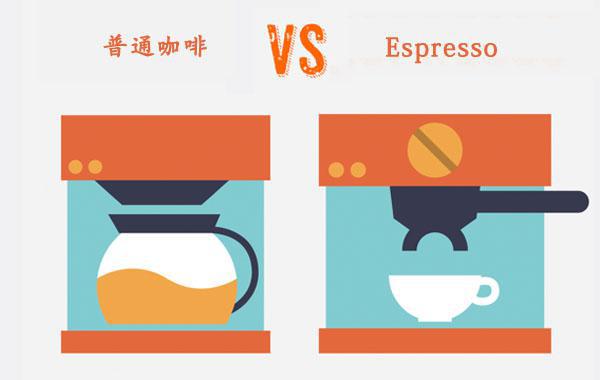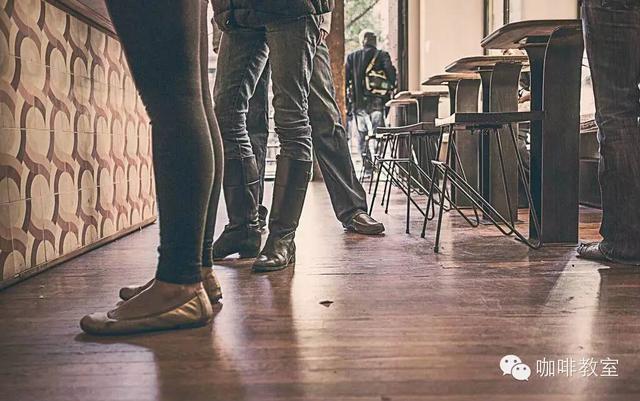Which is true love, Espresso or freshly brewed coffee?
In history, Italy is the first country in Europe to commercially import coffee. Now espresso, especially espresso (Espresso), which is known as the soul of coffee, dominates the global market with lightning speed. But what's the difference between Espresso and ordinary freshly brewed coffee?

1. What is Espresso? How is it different from ordinary fresh brewed coffee?
Espresso is a dark coffee with a strong taste made by a special extraction process. It has a short history, but it has quickly become a new favorite of coffee lovers in just a few years.
The principle of making Espresso is actually very simple, it is nothing more than what people often say, "9 atmospheres, 90 ℃, 30 seconds." But what exactly does all this mean? In fact, this means that a small but high concentration of Espresso can be extracted in as little as 30 seconds at a high temperature of 90 ℃ and 9 atmospheric pressure.
This new high-temperature and high-pressure extraction method can penetrate the inside of the coffee powder more than the traditional method, and the coffee powder used to make Espresso is generally more finely ground, so it can extract more of the internal components of the coffee powder, and its taste is naturally stronger.
2. Coffee fat: the typical feature of Espresso which is different from ordinary coffee
In addition to the strong taste and the small amount of a cup of coffee, another typical feature of Espresso can be distinguished from ordinary freshly brewed coffee, which is the floating coffee fat (Crema) on the surface of Espresso. So how did it come about?
It is often said that freshly ground coffee beans should be kept for one night before use. Why is that? In fact, this is because the freshly roasted coffee beans contain too much carbon dioxide, and if they are used to make coffee immediately after grinding, too many bubbles will hinder the extraction process.
Of course, in addition to the carbon dioxide contained in the coffee powder itself, there is also a lot of carbon dioxide involved in the air when the water suddenly returns to the normal pressure environment from the high pressure. Therefore, from the perspective of the production process of Espresso, when the extracted coffee flows out of the coffee machine, due to the change of air pressure, the liquid cannot carry the original carbon dioxide in the coffee powder and the air involved in the outflow, a lot of gas will gush out of the coffee surface, forming a layer of foam, which is coffee oil.
3. What is the function of Espresso coffee oil?
(1) to judge whether the coffee powder is fresh or not
In general, if a cup of Espresso is made of fresh coffee powder, there will be more coffee oil on the surface. And if the coffee fat doesn't look good, it may be because the coffee beans are too mature.
However, it should be noted that some coffee beans will be put in the bag to absorb carbon dioxide deoxidizer, so that the content of carbon dioxide is lower, and naturally produce less oil. Therefore, coffee oil can not be regarded as the only criterion to judge the quality of coffee.
(2) to judge the taste intensity of coffee.
We can also know the taste intensity of coffee by coffee fat. Usually, the darker the coffee oil is, the stronger the taste of Espresso is.
(3) sealed fragrance
Because the coffee oil is completely covered in the surface layer of Espresso, the aroma of coffee can be better sealed in the cup.
4. What's the difference in flavor between Espresso and freshly brewed coffee?
Usually, Espresso can be mixed from different kinds of coffee beans after fine grinding, its acidity is generally not high, the taste is very mellow and strong, but also has a certain sweetness to balance the bitterness of coffee.
Espresso
Ordinary coffee takes a relatively long time to make, so the sour and bitter taste will be more obvious, of course, the specific flavor is also related to factors such as the type of coffee beans. In addition, because the extraction is not thorough enough, the taste of brewed coffee is not as strong as espresso.
Regular coffee
Which is more caffeinated, Espresso or freshly brewed coffee?
As we all know, coffee generally contains a certain amount of caffeine. So which of the Espresso or freshly brewed coffee has more caffeine?
In fact, it depends on where you look at the problem: if you look at it by the amount of a cup, then the caffeine content of freshly brewed coffee must be higher, because coffee cups with Espresso are generally smaller. However, Espresso is more full-bodied, so if you look at a fixed volume, Espresso is obviously more caffeinated.
It is worth mentioning that because Espresso taste is very strong, so the average person will not drink too much at a time; on the contrary, drinking ordinary freshly brewed coffee often does not pay attention to control the amount of drinking, so it is often easy to consume more caffeine.
Which is true love, Espresso or freshly brewed coffee?
Although Espresso is called the soul of coffee, there is no saying that one process is better than another. As the saying goes, radish and cabbage have their own preferences, whether to drink Espresso or freshly brewed coffee is entirely up to you. In addition to different tastes of different people, different moods and drinking occasions or times will also have an impact on the choice of coffee. (text / the kitchn)
Important Notice :
前街咖啡 FrontStreet Coffee has moved to new addredd:
FrontStreet Coffee Address: 315,Donghua East Road,GuangZhou
Tel:020 38364473
- Prev

Still struggling to make a profit? 6 ways to make money in your cafe easily
Maybe you are dreaming of having your own boutique cafe one day. You may already own a small store, but you are trying to get out of the start-up phase. Or you are looking for ways to make such a lost profit. In fact, our dream may be to have a boutique cafe, but coffee doesn't mean everything. You also have to think about the business model, cost control.
- Next

Can popular science moms and new moms have coffee?
China Clinical Nutrition Network (lcyycc) can mothers-to-be and new mothers drink coffee? / photos by Freida (Xing) Pan / typesetting by Gentleman Ye / reprinted by Xiu Jing authorized by the Wechat platform (ID:joinawuplan) of Project Awo: by Freida (Xing) Pan, Master of Clinical practice and Clinical Nutrition from Rush University in Chicago (Rush University)
Related
- What grade does Jamaica Blue Mountain No. 1 coffee belong to and how to drink it better? What is the highest grade of Blue Mountain coffee for coffee aristocrats?
- What are the flavor characteristics of the world-famous coffee Blue Mountain No. 1 Golden Mantelin? What are the characteristics of deep-roasted bitter coffee?
- Can I make coffee a second time in an Italian hand-brewed mocha pot? Why can't coffee be brewed several times like tea leaves?
- Hand-brewed coffee flows with a knife and a tornado. How to brew it? What is the proportion of grinding water and water temperature divided into?
- What is the difference between Indonesian Sumatra Mantinin coffee and gold Mantinin? How to distinguish between real and fake golden Mantelin coffee?
- What does bypass mean in coffee? Why can hand-brewed coffee and water make it better?
- Unexpected! Ruixing Telunsu lattes use a smoothie machine to foam milk?!
- % Arabia's first store in Henan opens into the village?! Netizen: Thought it was P's
- Does an authentic standard mocha coffee recipe use chocolate sauce or powder? Mocha Latte/Dirty Coffee/Salty Mocha Coffee Recipe Share!
- What is the difference between Vietnam egg coffee and Norway egg coffee? Hand-brewed single product coffee filter paper filter cloth filter flat solution!

